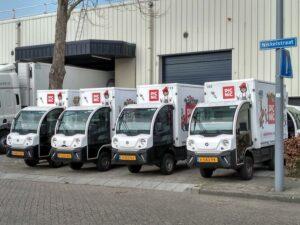Picnic targets break-even point
Dutch online delivery service Picnic is moving closer to profitability. The retailer is already writing black figures in its home market. Robotization of its warehouses is one reason for the improved profitability. In its second-largest market, Germany, Picnic aims to double its turnover by the end of the year.

Dutch online delivery service Picnic is getting closer to profitability. As reported by Deondernemer.nl, the e-commerce pure player last year made a profit in the Netherlands for the first time since its launch in 2015. Picnic co-founder Michiel Muller is quoted as saying that the robotization of its distribution centers was instrumental in reaching the break-even point. As a result, the company’s main objective in the Netherlands is to increase the level of robotization from the current thirty percent to fifty percent of volumes by the end of the year. Thanks to the efficiency increase, the 30 percent rise in sales in the past year has been handled without any additional expansion of the logistics infrastructure.
Picnic’s consolidated turnover rose by more than a third to 1.23 billion euros in 2023. Compared to 2022, the total loss increased from €209 million to €220 million, according to the Dutch business newspaper Financieele Dagblad. The loss for every euro of online sales generated fell from 22.8 cents to 18.0 cents (see chart). Picnic explained the negative result on continued heavy investment in its international expansion into Germany and France. Muller is quoted as saying that if the company were to make a profit in the current year as it did in the last four weeks of 2023, it would generate a positive Ebitda of 4 million euros in 2024.
The Netherlands still account for the lion’s share of the retailer’s sales, but this could soon change. The Dutch division generated net sales of €796 million last year, an increase of 28 per cent on the previous year. This means that Picnic is growing its turnover almost five times faster than the Dutch e-commerce market. According to Circana, the Dutch e-food sector grew by 6 percent in 2023. In Germany the retailer grew by 41 percent to 387 million euros and in France by 147 percent to around 50 million euros. For the current year, Picnic aims to almost double its turnover in Germany to 700 million euros. According to the company, several distribution centers in Germany are already generating a positive Ebitda margin, even without the implementation of automated fulfilment centers.
Picnic’s efficiency is based on a modern version of the ‘milkman’ model. The electric delivery vehicles only visit a specific delivery address once a day, as on a bus route. The company has previously stated that this approach has enabled it to make three times as many deliveries per hour as its competitors, while saving a third of the cost. This last-mile model allows the company to deliver without charge for a minimum order value of 35 euros in the Netherlands and 40 euros in Germany.
If an order is placed by 11pm at the latest, Picnic delivers the next day. Next day delivery means that Picnic does not need to hold stock but can deliver directly from the warehouse and can minimize waste.
Key investors in Picnic are German grocery market leader Edeka and The Bill and Melinda Gates Foundation.
Related news
Every second German drinks plant-based
🎧 Hallgasd a cikket: Lejátszás Szünet Folytatás Leállítás Nyelv: Auto…
Read more >Lidl is building a new administrative and logistics centre in Straubing
🎧 Hallgasd a cikket: Lejátszás Szünet Folytatás Leállítás Nyelv: Auto…
Read more >From the shopfloor: What the Mere format reveals about retail concentration
🎧 Hallgasd a cikket: Lejátszás Szünet Folytatás Leállítás Nyelv: Auto…
Read more >Related news
Historic price reduction at ALDI
🎧 Hallgasd a cikket: Lejátszás Szünet Folytatás Leállítás Nyelv: Auto…
Read more >A stable compass in the Hungarian FMCG sector for 20 years
🎧 Hallgasd a cikket: Lejátszás Szünet Folytatás Leállítás Nyelv: Auto…
Read more >









